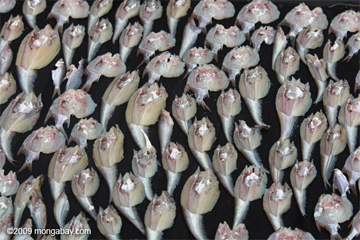|
|
Warming climate may favor small species over large ones, reports a study published Monday in the early online edition of Proceedings of the National Academy of Sciences.
The research, based on analysis of body mass of fish, plankton, and bacteria in European ecosystems, comes just weeks after scientists reported that sheep on a Scottish island are shrinking due to warmer conditions.
The new study, conducted by Martin Daufresne and colleagues from the Leibniz Institute for Marine Science in Kiel, Germany, found that individual species lost an average of 50 percent of their body mass over the past 30 years. The authors say their work “provides evidence that reduced body size is the third universal ecological response to global warming.” The other responses are the shift of species’ ranges toward higher altitudes and latitudes and seasonal shifts in life cycle events like migration, breeding, and feeding.

|
They note that the results are “in accordance with the ecological rules dealing with the temperature–size relationships” including Bergmann’s rule, which states that “warm regions tend to be inhabited by small-sized species;” James’ rule, which states that, “within a species, populations with smaller body size are generally found in warmer environments;” and the temperature–size rule, which states that “the individual body size of ectotherms tends to decrease with increasing temperature.”
The reasons for the shift towards smaller body size in aquatic ecosystems is still unclear. The earlier sheep study suggested that shorter and milder winters mean lambs do not need to put on as much as weight as they once did in order to survive their first year of life, a factor that could also impact fish populations. Nonetheless the researchers say the shift could alter food chains, with apex predators being particularly affected by shrinking prey.
“Although not negating the role of other factors, our study provides strong evidence that temperature actually plays a major role in driving changes in the size structure of populations and communities,” the authors write. “Our results suggest that upper trophic levels could be more sensitive to climate warming than lower ones.”
Last week the National Oceanic and Atmospheric Administration reported that the global ocean surface temperature in June rose to 62.6 degrees Fahrenheit (17 degrees Celsius), the warmest since record-keeping began in 1880.
Martin Daufresne, Kathrin Lengfellner, and Ulrich Sommer. Global warming benefits the small in aquatic ecosystems. PNAS Online Early Edition the week of July 20-24 2009
Related articles
Global warming causes sheep to shrink
(07/02/2009) Climate change is shrinking Scotland’s wild Soay sheep despite the evolutionary advantages of having a large body, report researchers writing in the journal Science. The results suggest that the decrease is primarily an ecological response to environmental variation over the last 25 years, rather than evolutionary change.
Extinction, like climate change, is complicated
![]()
(03/26/2007) Extinction is a hotly debated, but poorly understood topic in science. The same goes for climate change. When scientists try to forecast the impact of global change on future biodiversity levels, the results are contentious, to say the least. While some argue that species have managed to survive worse climate change in the past and that current threats to biodiversity are overstated, many biologists say the impacts of climate change and resulting shifts in rainfall, temperature, sea levels, ecosystem composition, and food availability will have significant effects on global species richness.